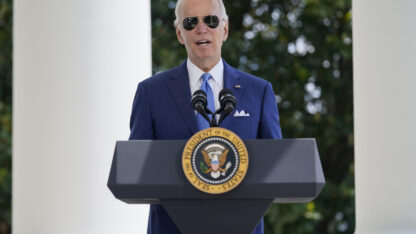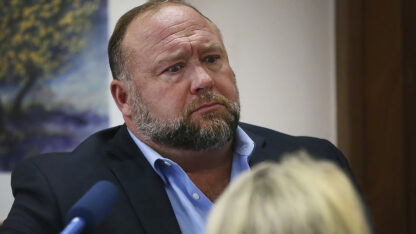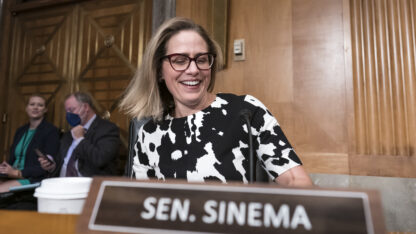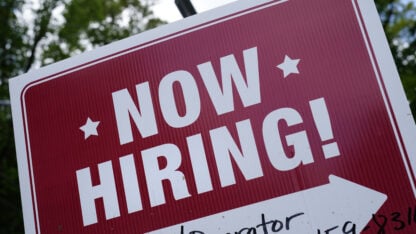As standalone anecdotes, these might not be a huge deal. However, they are also a part of a trend of Republican candidates ignoring or actively avoiding legacy media — particularly national outlets.
The phenomenon is impossible to quantify, but many Republican candidates are showing that they don’t want – or need – to get their messages out via legacy media outlets. That can reduce the scrutiny they face while running for public office, hampering voters’ ability to make informed choices.
A large group of reporters was kept out of a rally this spring for Republican gubernatorial candidate Doug Mastriano in Pennsylvania. CBS’s Robert Costa confronted a man who was blocking press from entry.
“If you’re with the campaign, we can have a dialogue,” Costa said.
“No dialogue,” the man responded.
In addition, reporters have been frustrated by getting extremely limited access to other Republicans running for public office, like Georgia Senate candidate Herschel Walker, and Alaska congressional candidate Sarah Palin.
And the Republican National Committee voted unanimously this year to withdraw from the Commission on Presidential Debates ahead of 2024. Chair Ronna McDaniel said the party would find other platforms for debating.
Recently, the Florida GOP allowed conservative outlets into the party’s Sunshine Summit, but barred many mainstream reporters, including Dave Weigel, author of the Washington Post‘s campaign newsletter, “The Trailer.”
“You have one person from the campaign tweeting a photo from inside the room and talking about how great the view is that the journalists can’t see,” he said. “Spokespeople who are not answering my basic questions, like, ‘Is there a recording of this event?’ are taking the time to make fun of reporters for going there.”
Indeed, Gov. Ron DeSantis’ spokeswoman Christina Pushaw taunted reporters on Twitter afterward.
“It has come to my attention that some liberal media activists are mad because they aren’t allowed into #SunshineSummit this weekend,” she wrote. “My message to them is to try crying about it.”
DeSantis also held a ceremony to sign a bill into law last year that aired exclusively on Fox News with no access for other media.
The relationship between conservatives and mainstream press has been fraying for a long time
It is entirely true that Democratic candidates also dodge questions and have private events.
It’s also true that GOP distrust of media is decades old. Vice President Spiro Agnew, for example, famously lambasted media coverage of Richard Nixon in 1969.
But to Weigel, it’s different this year on the Republican side.
“In this cycle, I’ve started to see more Republican candidates avoiding the press, blocking the press from events, and taking advantage of the fact that there is conservative media that will ask different questions and has a different audience,” he said. “And to be honest, an interview with one of those websites might get more views from the people who vote in a Republican primary than interview with me.”
“So I’m obviously not saying to the world, ‘Stop talking to the media,'” he added. “I’m saying, just objectively, there is a media infrastructure built up so that you don’t need, if you’re a Republican candidate, to talk to us.”
In other words, this is the outcome of a long-growing conservative media ecosystem. As the Republican base increasingly gets their news primarily from right-leaning news outlets they agree with, Republican candidates will increasingly grant access primarily to friendly right-leaning news outlets, meaning there are fewer and fewer outlets who can provide a broad view of what’s going on in American politics.
Scott Jennings, a Republican strategist and CNN commentator, agrees and says that in deciding whether to do an interview, there’s always a cost/benefit analysis. And what is the benefit, he asked, of doing a potentially adversarial interview with an outlet you think is biased anyway?
“The risk of submitting yourself to what the campaign would consider to be risky questioning — the possibility that you might end up saying something that winds up in $10 million worth of ads from the other side — it’s like the benefit of doing the interview does not outweigh the risk,” he said. “And so you just don’t do it.”
And in this cycle, avoiding some interviews can mean avoiding any number of tough questions – about Jan. 6, abortion or same-sex marriage, for example.
In addition to using right-wing media, campaigns can also now connect with their supporters without media middlemen at all, Jennings added.
“When I started 20 years ago, you know, you spent a good chunk of every day on campaigns trying to figure out how to get the media to cover whatever you’re doing that day,” he said. “But now, you don’t need an intermediary to connect with your supporters any more than you can connect with your most fervent supporters directly via social media, and campaign email lists, and so on and so forth.”
It’s certainly not only Republicans who have discovered this; after having a stroke, Pennsylvania Democratic Senate candidate John Fetterman largely stayed away from interviews and events for weeks, gaining attention instead in ongoing meme wars with Republican candidate Mehmet Oz. And this did mean that, for a period, the public couldn’t be clear on Fetterman’s health status.
But there is a big difference between this instance and a broader campaign of delegitimizing media, says Kathleen Hall Jamieson, professor of communication at the University of Pennsylvania.
“There’s a difference between hunkering down but hoping that all of the available media will cover you, and planning a strategy which deliberately says you can’t trust those other media venues,” she said.
Claims of liberal media bias are used as political tactics
“You can’t trust those venues” is a long-standing argument from the Republican side — that legacy media has a liberal bias.
Trust numbers reflect this belief — just 11% of Republicans trust the mass media, compared to nearly 7 in 10 Democrats, according to Gallup.
The question of liberal bias isn’t something we can settle in a small section of one article, and coming from a legacy media outlet, a claim that we aim to be unbiased would inevitably come off to some as…well…biased.
But it is also nevertheless true that claims of liberal bias are themselves a political tactic.
Which leads to one more factor contributing to hostility toward reporters: Donald Trump, who infamously called the press “the enemy of the people.”
And now, that hostility is an overt part of other Republicans’ identities.
“In the old days, your assumption would be, if a national newspaper is putting a negative story out there, we have to engage with it because we’ve got to get our side of the story in and make sure it’s not a one-sided deal,” said Jennings. “Now, I think it’s actually different in that you might engage, but you might also make the determination that if you’re a Republican, well, if The New York Times runs a hit piece on me, that’s a badge of honor.”
Mainstream news also doesn’t have the broad reach it once did. If, say, the national evening news is losing eyes and ears to right-wing outlets, there’s less reason for candidates to respond.
Local coverage remains crucial to voters and candidates
It’s not every candidate, and they’re not avoiding every mainstream outlet. Many candidates are more likely to be friendly to local than national press, says Mark Harris, a Pennsylvania-based Republican strategist.
”The best thing you can still do is get a 6 o’clock local NBC, ABC, CBS TV news hit,” Harris said. “Local TV is number 1 and local print is number 2.”
NPR contacted several political reporters from around the country and found a range of experiences. One in Texas reported nothing out of the ordinary this year. A political reporter in Iowa said they’re seeing some evidence of Republicans avoiding scrutiny — Republicans are far outnumbered at a popular candidate forum at the Iowa State Fair, for example.
That’s important because scrutiny from local press can often get at issues more immediate to voters’ lives.
Alex Burness, who recently left the Denver Post, said he sees a definite partisan difference.
“I have seen it on both sides. It is coming much more often from Republicans,” he said, pointing to a recent campaign event for GOP gubernatorial candidate Heidi Ganahl.
“Colorado’s gubernatorial nominee on the Republican side held an event to announce — to appear publicly for the first time with her [lieutenant governor] pick, who is an election denier,” he said. “They said at the onset, ‘We’re not taking any questions.’ And we in the little media area had a conversation before she went on. We’re like, ‘Well, why are we here? We’re not here to give PR.'”
And those kinds of questions are important to ask, says Khadijah Costley White, a professor of media studies at Rutgers University. Rather than scrambling for access to events, she said, reporters need to think harder — in an atmosphere of constant disinformation — about what access will achieve.
“Is it important to have voices regardless of what they say, regardless of whether or not they’re using that opportunity as a way to distribute disinformation or misinformation?” she asked. “Is that valuable to democracy?”
Where does this lead?
All of this may come off as a lament that some GOP candidates are making reporters’ lives harder. That is certainly the read of people like Ron DeSantis’ spokesperson when she tells reporters to “cry about it.”
But as more candidates have ostensibly public events and don’t allow people to tell the public what is said at those events, it raises concerns about accountability.
“I’m a Republican communications guy and engage with the traditional media and I’m on CNN,” Jennings said. “So I say this with all sincerity: We have to have a trusted press. It’s necessary to democracy.”
However, candidates aren’t incentivized to talk to the press for democracy’s sake; they talk because it serves their interests. The question is where all this leads.
“I’m not saying, ‘How dare they do this?’ I’m interested in where this is going,” Weigel said. “If we’re returning to the days when Democrats have one newspaper or Republicans have another newspaper, we might not like that, but there’s precedent for it.”
At any rate — I never did do that piece on Wisconsin Republicans. I simply didn’t have enough people to talk to me.
If that’s true for enough outlets, it means uneven coverage of the two parties and an electorate that has to work ever-harder to be fully informed.
Copyright 2022 NPR. To see more, visit https://www.npr.org.
9(MDAxODM0MDY4MDEyMTY4NDA3MzI3YjkzMw004))
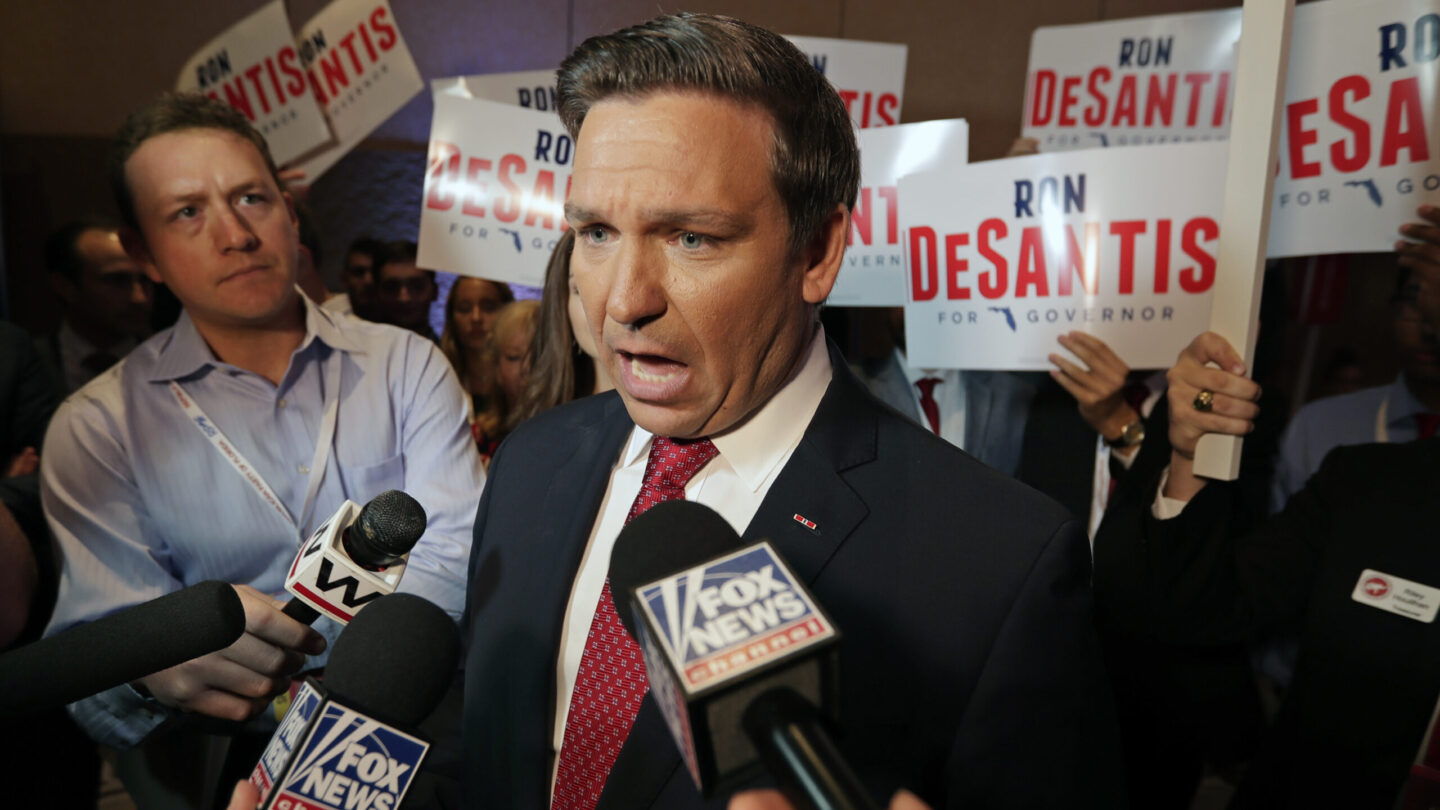
9(MDAxODM0MDY4MDEyMTY4NDA3MzI3YjkzMw004))
